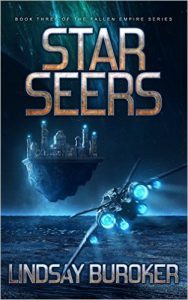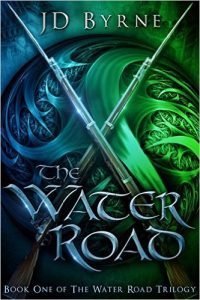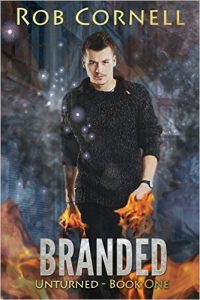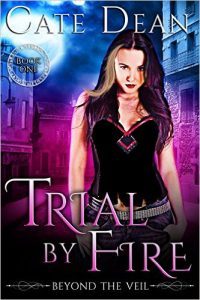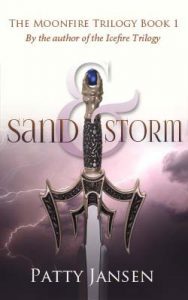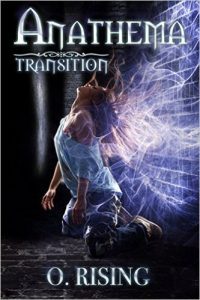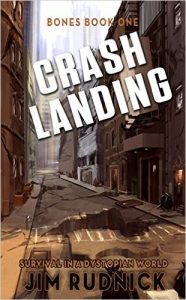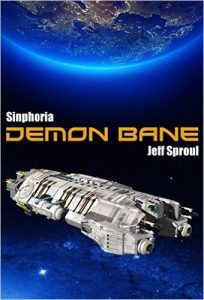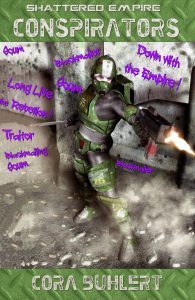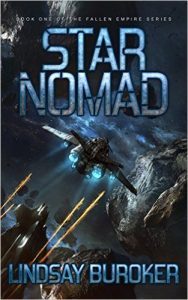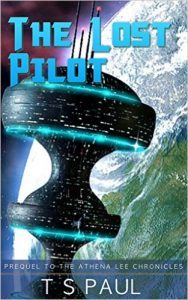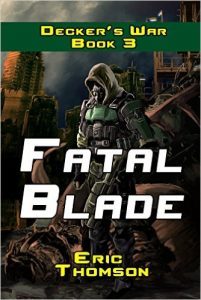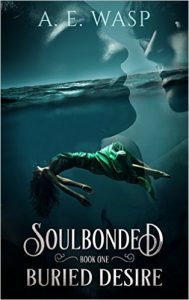Cora Buhlert's Blog, page 97
June 29, 2016
Indie Speculative Fiction of the Month for June 2016
 It’s that time of the month again, time for “Indie Speculative Fiction of the Month”.
It’s that time of the month again, time for “Indie Speculative Fiction of the Month”.
So what is “Indie Speculative Fiction of the Month”? It’s a round-up of speculative fiction by indie authors newly published this month, though some May books I missed the last time around snuck in as well. The books are arranged in alphabetical order by author. So far, most links only go to Amazon.com, though I may add other retailers for future editions.
Once again, we have new releases covering the whole broad spectrum of speculative fiction. We have a whole lot of space opera and military science fiction this month as well as postapocalyptic fiction, dystopian fiction, paranormal romance, epic fantasy, urban fantasy, young adult fantasy, horror, two awesome short fiction anthologies, vampires, demons, fae, dragons, half-demon PIs, half-vampire PIs, sorcerers, starseers, star rebels, aliens, gargoyles, rock ‘n roll zombies, galactic conspiracies, forced marriages, the end of the world and much more.
Don’t forget that Indie Speculative Fiction of the Month is also crossposted to the Speculative Fiction Showcase, a group blog run by Jessica Rydill and myself, which features new release spotlights, guest posts, interviews and link round-ups regarding all things speculative fiction several times per week.
As always, I know the authors at least vaguely, but I haven’t read all of the books, so Caveat emptor.
And now on to the books without further ado:
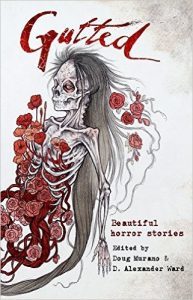 Gutted: Beautiful Horror Stories by Clive Barker, Neil Gaiman, Ramsey Campbell and others:
Gutted: Beautiful Horror Stories by Clive Barker, Neil Gaiman, Ramsey Campbell and others:
GUTTED: BEAUTIFUL HORROR STORIES – an anthology of dark fiction that explores the beauty at the very heart of darkness. Featuring horror’s most celebrated voices, as well as a number of exciting new talents: Clive Barker, Neil Gaiman, Ramsey Campbell, Paul Tremblay, John F.D. Taff, Lisa Mannetti, Damien Angelica Walters, Josh Malerman, Christopher Coake, Mercedes M. Yardley, Brian Kirk, Stephanie M. Wytovich, Amanda Gowin, Richard Thomas, Maria Alexander and Kevin Lucia.
What is beautiful horror?
Awe meets ache.
Terror becomes transcendence.
Regret gives way to rebirth.
Edited by Doug Murano and D. Alexander Ward. With a foreword from Cemetery Dance magazine founder Richard Chizmar. Interior artwork by Luke Spooner. Cover artwork by Caitlin Hackett.
“Truly one of the best anthologies I have ever read.” – Paula Limbaugh, Horror Novel Reviews
The mysterious and powerful Starseers have Captain Alisa Marchenko’s daughter, and she will do whatever she must to get her back, even if it means traveling to their stronghold and confronting them personally. Unfortunately, her strongest ally, the cyborg Leonidas, may become a liability since the cyborgs and the Starseers have a long history of hating each other. It doesn’t help that Leonidas and Dr. Dominguez have a mission of their own, one that could jeopardize all that Alisa is fighting for.
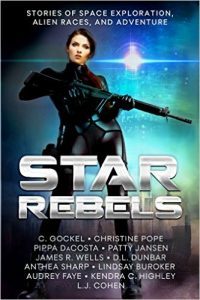 Star Rebels: Stories of Space Exploration, Alien Races and Adventure by Lindsay Buroker, C. Gockel, Patty Jansen, Pippa DaCosta, James R. Wells and others:
Star Rebels: Stories of Space Exploration, Alien Races and Adventure by Lindsay Buroker, C. Gockel, Patty Jansen, Pippa DaCosta, James R. Wells and others:
There are rebels among the stars…
Meet eleven protagonists battling to save themselves and the ones they love. Human, cyborg, clone, or alien, they’ll find themselves pitted against intergalactic crime bosses, interstellar mercenaries, a quantum-wave-riding collective mind, and the universe itself. Along the way, there’s plenty of action, adventure, humor, and even some romance.
Written by the freshest voices in science fiction, these stories are short, but they’ll light your imagination like a solar flare. Strap yourself in and join the rebellion! Download this collection today.
Features stories by Lindsay Buroker, C. Gockel, Patty Jansen, Pippa DaCosta, James R. Wells, Christine Pope, L.J. Cohen, D.L. Dunbar, Anthea Sharp, Audrey Faye and Kendra C. Highley.
Two women are about to expose a terrible secret that will turn their world upside down.
For centuries the great river known as the Water Road separated the Altrerians in the north from the Neldathi in the south. When the Neldathi clans united and struck out across the river, the nations of Altreria formed an alliance, the Triumvirate, to drive them back. For more than a hundred years after, the Triumvirate kept the Neldathi barbarians at bay, fighting amongst themselves across the Water Road.
Antrey is a woman without a country, the daughter of a Neldathi mother and an Altrerian father. She’s found a role for herself in Tolenor, the headquarters of the Triumvirate, that’s given her access to a secret the alliance has kept for generations. When she finds it, she explodes with rage and embarks on a quest to find justice for the Neldathi people.
Strefer is a reporter without a story, desperately working the streets of Tolenor for any kind of lead. When Antrey flees the city, Strefer slips in and discovers her uncovered secret, stained with blood and fury. It’s the story of a lifetime, one powerful forces want to keep her from telling. With the help of a renegade Sentinel, Strefer sets out for a mythical city in hopes she can make the world listen to the truth.
Together, they’ll inflame the passions of a people and set the world alight. The Water Road – first book of The Water Road trilogy.
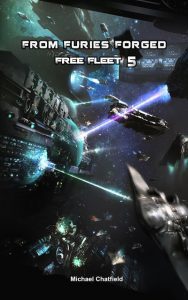 From Furies Forged by Michael Chatfield:
From Furies Forged by Michael Chatfield:
The Kalu are not a long lost nightmare anymore.
They came from the black.
They destroyed Rosho.
They ravaged Heija.
That was just the scouting force.
They are coming back.
Power those reactors, charge those rail cannons and ready the fighters. The Free Fleet is going to war.
Sorcerer Sebastian Light has long used his powerful magic to corner the market on demon hunting in Detroit. With control over the elements, he can burn through bounties almost as fast as the Ministry can issue them—much to the chagrin of the Motor City’s other hunters. But after a group of vampires taints him with their blood in an effort to turn him, collecting bounties is the least of his worries.
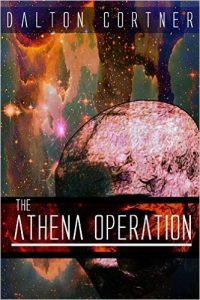 The Athena Operation by Dalton Cortner:
The Athena Operation by Dalton Cortner:
In a future where wars and poverty are quickly on the rise, the universe has hit its ultimate enemy: itself. Once known for their dedication and loyalty to the good of the universe, the seythra, a strong-willed alien race, have attacked and declared war on the rest of the universe. Now, throwing their immense numbers against the opposition of the Confederate Military, hope is dwindling. Trust between factions, races, and planets are weakening by the moment. What caused the seythra to rebel? Why can they no longer be reasoned with? And most importantly, can anyone stop them in time?
Seraph Aydrian, an infamous soldier one reprimand away from termination, must lead an army of soldiers, mercenaries, and civilians against the seythra assault and not only stop the chaos and destruction, but uncover the dark and sinister motives that are driving the murders.
Reese Pierpoint is half human, half fae, and one hundred percent trying to figure out how to live with both sides of her heritage.
When the deaths of three local kids turn out to be sacrifices, Reese finds herself plunged into the world her overprotective mother had been shielding her from all her life.
Bran Malcolm – half human, half demon PI – is on the hunt for the creature responsible for the deaths. A creature who is using the dead children’s blood to create a doorway to escape his prison.
But when Bran crosses paths with Reese, he falls for her – hard – and the distraction has him off his game. Until Reese becomes the focus of the killer’s plan. Now Bran’s on a mission to do anything to keep her safe.
Even if it costs his life.
On sale until July 1!
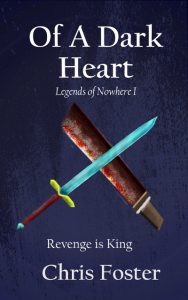 Of A Dark Heart by Chris Foster:
Of A Dark Heart by Chris Foster:
A supernatural killer. A prophetic gargoyle. A tale of revenge.
Excalem wants vengeance.
His daughter lay cold upon the coroner’s slab. Someone had taken her from this world. Yet there was no trace of harm. There were no answers to the questions he asked. She was simply gone. Pale. Cold. Dead.
Excalem hands in what little morals he had in exchange for the sword.
Walking through the desert, cracked terracotta under his feet and endless blue above he thinks he has gone mad. Or died. He is out of water, out of place and feels out of time. This is a world he didn’t believe in not long ago. Nowhere both its name and description. He cannot stop, he is the cat after the rat but the dog is coming.
Both pursued and pursuing, he knows only one thing.
There will be vengeance.
The Gargoyle said so, and rocks don’t lie.
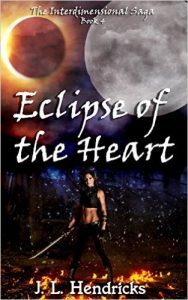 Eclipse of the Heart by J.L. Hendricks:
Eclipse of the Heart by J.L. Hendricks:
Why do I have to be the girl of the prophecy?
Then there is the ripper threat too, everywhere I turn in Sendryl we’re attacked. There’s a car bomb that hurts one of my team members, badly.
All guys are confusing. Fae or Human, doesn’t matter. When it comes to affairs of the heart, they’re all the same. Fillie thinks I can have either one, but do I trust them with my heart?
It may not matter if the trial goes bad or we don’t make it back to Earth.
It’s time for me to put on my big girl panties and make a choice.
This is Book 4 of The Interdimensional Saga
 Massive Unrest by Michael Hustleborn:
Massive Unrest by Michael Hustleborn:
When the dead no longer rest in peace, nobody rests in peace.
Johnny, an American rocker living in Germany, dreams of stardom. Just when it looks like it might happen, people start dying in droves. The problem is they’re not staying dead. Johnny and his new friend Lena are sent scurrying to survive, but while Johnny can definitely rock a crowd, he’s no doomsday prepper. When they team up with a modern-day ax-wielding viking, things start looking up, but all is not as it seems.
A zombie plague is spreading across the planet faster than a joint at a rock concert and the madman who released the virus is still out there. To make matters worse, he’s not even close to being done yet.
As everyone scrambles to find a place that’s defensible against massive hordes of undead, one crucial question remains: Who is the bigger threat, the living or the undead?
The entire world laid to waste. There are no second chances.
The ancient machine that produced icefire was destroyed twenty years ago, but the deadly magic is again on the increase. No one understands why or where it’s coming from.
Icefire controls the weather and massive changes in weather patterns plunge the northern half of the inhabited world in deep drought. The tide of refugees swells, but as long as no one knows where the icefire is coming from, nowhere is safe.
King Isandor sends people to investigate a concentration of icefire in the mountains at the border, but two consecutive patrols both vanish. It appears that, after having suffered badly in wars, the neighbouring country Arania is on the offensive, and is using icefire as weapon. Their culture is harsh and their barbarism knows no boundaries.
Meanwhile two young meteorology students make a string of discoveries about icefire that will change the way the people understand the world. They’re on the threshold of the age of enlightenment, but vital knowledge necessary to save their world may well get lost when war overruns the inhabited world.
Only 99 cent until July 4!
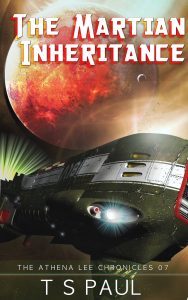 The Martian Inheritance by T.S. Paul:
The Martian Inheritance by T.S. Paul:
Athena Lee and her sidekick Wilson return for this action packed adventure. Athena is sent to Mars on a secret mission to help capture a war criminal responsible for the deaths of thousands. He is hiding on the Planet Mars. Athena has family she had never met on the Red Planet. This is her chance to visit them. The Cabal has given the fugitive shelter and is plotting to rule. Mysteries and plots abound as Athena discovers the meaning of her inheritance.
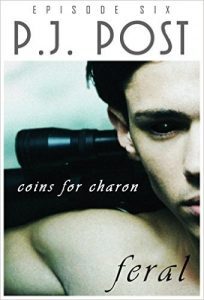 Coins for Charon by P.J. Post:
Coins for Charon by P.J. Post:
This Romance brought to you by the end of the world…
The only way out is the river, two short blocks away.
Jem and Pixie are fighting for their sanity, while Holly lies unconscious, burning with fever. Keats and Casey can only watch her eyes with dread, and be ready should she turn. Sam is fighting for love, for a life and for happiness. Emily is fighting to hold them together.
And they are all looking to Lane for salvation, but he’s out of second chances, out of options and quickly running out of time as the city burns to the ground.
Two blocks might as well be forever, the streets are overrun with Button Eyes. And for as long as they remain, no secret will be safe, no sacrifice will be held sacred, and no life precious; before all is done, Freemont will have its due.
Author’s Note: Coins for Charon is the sixth and final Episode of Feral.
Two years ago, The Pulse—a sudden shift in Earth’s electromagnetic field—caused a global blackout and wiped a minute from mankind’s collective memory. This event introduced superhuman powers to our world and changed everything as we knew it.
Now two young women are caught in the chaos of a changing world:
Christina Chung, an antisocial misfit whose force fields are fueled by the social bonds she broke during the event of her transition.
Former coke addict Sarina Baumann, whose reality-altering power forces her to abandon everything she holds dear.
The girls find themselves entangled with the renegade hero Radiant and the authorities that made him. The three must find a way—and a place—to be the heroes they’re destined to become. But sometimes, even the heroes fall…
“As the first wisps of atmosphere touched the badly damaged explorer ship, the craft was on it’s own AI–the pilot and nine of the ten occupants were already dead.
The only alive human lay in the robo-doc tank in the rear of the ship where he’d been for almost a full week. He had been injured during an asteroid incursion and had been placed in the robo-doc then. Now he lay half awake, half in a stupor, not knowing that the rest of the Drake’s crew were probably dead.
Boathi sphere ships had come upon the Drake twenty light years out-wards, and had so severely damaged the ship, that even as the pilot lay dying and he kicked it into AI and called on full FTL, their fate looked sealed…
Inside the robo-doc tank, the surviving human lay in the liquid bath surrounding him, and he was still in that stupor of drugged medical aid. While he couldn’t read it, on the interior visor, lay the dashboard with information for the patient—and it appeared he had still another two and a half days in here.
Alone…
Defenseless and in a sealed tank, as the AI would try to keep the robo-doc up and running to enable his recovery…at least that was it’s next task…”
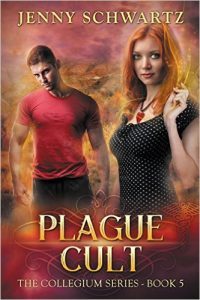 Plague Cult by Jenny Schwartz:
Plague Cult by Jenny Schwartz:
In a small Texas town a desire for love becomes a curse that could unleash a deadly plague.
Ruth Warner is estranged from her family. She loves them, but her magic makes her an outsider in Bideer, Texas. Ruth has built a new life in New York. She’s a healer at the Collegium, respected and…lonely. Sometimes, you have to go home.
Ruth’s boss orders her to Bideer after a local coroner reports a suspicious death. Could the new cult in town, a lonely hearts club, be playing reckless games with a death curse?
But if Ruth is going home, she’s not going alone.
Shawn Jackson is a Collegium guardian, a mage trained to fight evil. He’s also a man accustomed to keeping secrets. He’s a hollerider, a huntsman; one of those who birthed the legend of the Wild Hunt. When he unleashes his magic, terror rides with him.
As evil stalks an innocent town, the dedicated healer and battle-hardened marine must heal their own broken hearts to prevent a devastating plague.
***
Warning: “Plague Cult” includes a haunted house, an unconventional ghost, and a home renovation love story.
If you love your paranormal romance fast-paced, intense and chilling, “Plague Cult” is irresistible.
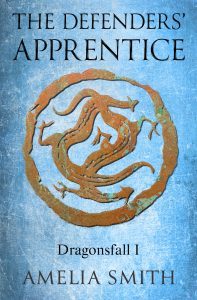 The Defenders’ Apprentice by Amelia Smith:
The Defenders’ Apprentice by Amelia Smith:
The Defenders’ order is dying, but that’s no surprise. After all, they’ve been in hiding for over a hundred years, and apprentices are getting harder to find – hardly anyone can see the dragons any more.
Eppie picked pockets on the streets of Anamat for years before one of the Defenders noticed her. She hid well, but one day she picked the wrong pocket, or was it the right one? She sets out to help try to save the dragon Tiada, but if her mentor and the others fall in the battle, who will defend the dragons against the next set of invaders?
Forget what you think you know of the universe. This is Sinphoria.
The universe writhes under the influence of sin—a primal bond empowering infernal creatures.
The phoenix Mira is a sentient being born of the stars. Her purpose is to rid the universe of the demonic beings that plague it. The self-governed world of Malstyx is a breeding ground for sin and corruption. Mira’s kin feel that Malstyx is beyond saving. If the situation escalates and threatens other worlds, then they would step in and purge Malstyx of all its inhabitants. It was up to Mira to prove them wrong and keep the shadows at bay.
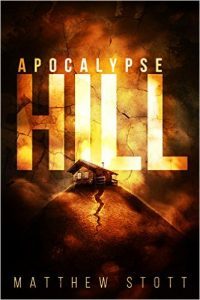 Apocalypse Hill by Matthew Stott:
Apocalypse Hill by Matthew Stott:
The end of the world is just a game.
The Hill arrived in Apoc, in the far north of England, during a storm. The soil was soaked in ancient blood and the grasses that clung to its slopes were slashes of vicious crimson. The Hill did not arrive by chance. The Hill came for a reason.
There’s Mary, who saw her mother murdered when she was still in single digits and is now being pushed to do something dreadful by forces she can’t understand. There’s Bill Reed, trying to distract himself from worrying about his daughter by focussing on his latest novel, who finds himself waking to a world of familiar faces turned monstrous. And then there’s Alice, a horror movie loving young girl sat in a car alone in the night as she awaits her Dad’s return, trying to ignore the unnatural noises creeping from the shadows outside.
Dark forces are at play in Apoc Hill. The inhabitants will become unwilling pawns in an ancient game between the darkness and the light. An ancient game that could see the entire world laid waste.
‘Apocalypse Hill’ is the first part in author Matthew Stott’s thrilling new supernatural fantasy miniseries.
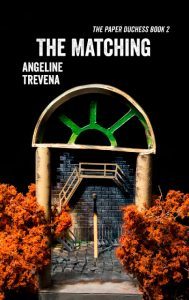 The Matching by Angeline Trevena:
The Matching by Angeline Trevena:
There was a time when a girl’s wedding day was the happiest day of her life.
In Falside, girls are a rare commodity; protected, controlled, and tracked by the administration. They spend their days idly waiting to be married off to the highest bidder.
When the marriage announcements include Tale’s lover, Freda, the women will do anything to stop the match from happening.
Their relationship is forbidden, and as members of the resistance, they’re already risking everything.
But as their attempts to stop the wedding fail, both women have to decide what they’re willing to sacrifice for love.
 Send to Kindle
Send to Kindle
June 26, 2016
Rest in Peace Götz George a.k.a. Horst Schimanski
I was planning to blog about the slyly subversive content of Independence Day today, in response to an article about the movie I vehemently disagreed with. However, then I saw on Twitter that German actor had died aged 77, which completely derailed my plans. Here is an obituary from the Süddeutche Zeitung and here is one from the Deutsche Welle.
If you lived in Germany in the past sixty years, you will have seen Götz George in a movie or on TV at some point. He was the son of Heinrich George and Bertha Drews, two of the biggest stars of Weimar Republic and Third Reich era Germany, and his career spanned a stunning 63 years, longer than either of his parents.
Götz George debuted at age 15 alongside a teenaged Romy Scheider in the romantic melodrama Wenn der weiße Flieder wieder blüht (When the white lilac blooms again), which hides an interesting look at single motherhood in postwar Germany behind its sappy exterior and silly songs. In the 1960s, he fought Fu-Manchu and appeared alongside Lex Barker and the late Pierre Brice in several Winnetou movies and even wound up getting the girl over Winnetou and Old Shatterhand (I’m sure they found consolation in each other).
But Götz George’s big breakthrough came in 1981, when he took the role with which he would be identified for the rest of his life: Horst Schimanski, the unapologetically working class cop from Duisburg in the Ruhrgebiet, whom George played for 32 years, first in the long-running crime drama series Tatort und later in his own eponymous series.
If you haven’t grown up with the staid and dull West German television of the 1970s and much of the 1980s, it’s hard to imagine what a revolution Schimanski was. Because until 1981 (and throughout the 1980s at least) German TV cops were distinguished elderly gentlemen in tweed jackets who solved genteel crimes in genteel upper middle class suburbs and whose antics had nothing whatsoever to do with anybody’s real life. Here is an example from 1980 featuring Schimanski’s immediate Tatort predecessor Kommissar Haferkamp (played by Hansjörg Felmy, a fine actor who deserved better than this).
And now take a look at Götz George’s debut as Horst Schimanski in the Tatort episode Duisburg Ruhrort.
The first three and a half minutes are a tiny masterpiece of characterisation, opening with a lingering shot of Horst Schimanski’s back (showing off Götz George’s impressive muscles in a non-male-gazey way that was rare before the 2000s) and the industrial Ruhrgebit landscape behind him. The camera then follows a clearly hung-over Schimanski through his kitchen, as he makes himself an anti-hangover cure, gathers up the beer bottles left over from last night and leaves, all to the stains of “Leader of the Pack” by The Shangri-Las (edited out of the YouTube video because of stupid copyright issues). Within the space of a few minutes you immediately know who this guy is and he hasn’t even said a single word yet.
And when Schimanski finally speaks at the 3 minute mark and yells, “Klappe, du Idiot, und hör auf mit dem Scheiß” (Shut up, you idiot, and stop that shit!) to the elderly man who is throwing his furniture out of the window, even the last viewer realised that Kommissar Haferkamp and his genteel fellow inspectors had left the building and that the future had arrived. And many viewers weren’t happy at all.
Contrary to popular belief, Götz George wasn’t the first person to utter the word “Scheiße” on German TV, that honour belongs to Dietmar Schönherr who said it back in 1966 in the science fiction TV classic Raumpatrouille Orion. Nonetheless, the foul-mouthed utterances of Horst Schimanski caused a massive firestorm among more conservative viewers, because won’t someone think of the children, who will now learn such horrible words from TV (which struck me as ridiculous even at the age of eight, because everybody I knew already knew those words). And of course it’s only appropriate that Götz George, who was reportedly named after the most famous curser in German literature, would be the one to normalise swearing on German TV. Coincidentally, no one in 1981 complained about the racial epithet used in the dialogue shortly after the “Scheiße” bit, which is very telling.
Horst Schimanski continued to be unconventional and controversial (more controversy was caused by Götz George appearing nearly naked in the 1984 episode Zweierlei Blut – even my parents were horrified, while I quietly hoped he would drop the towel). Gone were the genteel upper middle class suburbs, instead Schimanski investigated crimes in working class neighbourhoods and dealt with thefts of union funds, football hooligans, sexual child abuse and racist attacks on Turkish-Germans (coincidentally, Schimanski even had a Turkish German lover in the 1985 episode Zahn um Zahn). The huge success of the Schimanski Tatorte and the social realism of the crimes and settings ushered in an era of socially conscious Tatorte that still continues today.
Now, thirty-five years later, part of what makes the old Schimanski Tatorte so fascinating is that they offer a glimpse into a postwar working class world of grimy towns and rusty industrial estates, of corner pubs and allotment sheds, that was already rapidly vanishing by the time those episodes were shot (see this clip from Das Mädchen auf der Treppe for an example, complete with music by Tangerine Dream). And indeed, the dying pangs of the old industry occasionally became the subject of Schimanski episodes.
Revolutionary as the Schimanski Tatorte were, they might have been even more revolutionary, if Götz George had had his way and had been allowed to play Schimanski as a gay man. But if a working class cop saying “Scheiße” and ending up naked on a football field caused controversy, that would have been nothing against the firestorm caused by a gay man working as a cop in a mainstream TV show. And so Schimanski was resolutely heterosexual with a succession of lovers.
However, in the very early episodes, George still plays Schimanski as a closeted gay man who is infatuated with his straightlaced partner Tanner, played by Eberhard Falk who preceded Götz George into that great Ruhrpott in the sky in 1994. It’s never made explicit, but the signs are there, if you know where to look, perhaps never clearer than in what would be Schimanski’s finest hour and probably the best Tatort of all time, the 1982 episode Kuscheltiere (Plush toys). Trigger warning for harm to children:
In this Tatort episode, Schimanski tackles the illegal adoption industry where Vietnamese kids are sold to childless German couples (there’s a drug smuggling plot, too). When one of the kids winds up dead, Schimanski and Tanner get involved. Once again, it’s a ripped from the headlines case, because a lot of couples adopted Vietnamese children in the 1970s and early 1980s and often had to deal with blatant racism.
The most memorable moment of this episode comes near the end (here, though you should really watch the whole thing), when Schimanski realises why the couple to whom he’d traced the dead kid could still present a living adopted kid, namely the kids were twins and one died (of natural causes). At the very end of the episode, the adoptive father shows up with the surviving kid in tow and basically dumps her onto Schimanski, complaining that he paid sixty thousand Deutschmarks for the kids and then one died, his wife fell into depression and besides, the neighbours are talking and a kid like that doesn’t really belong into a nice German suburb anyway. And Schimanski tenderly takes the abandoned little girl in his arm, turns her away, so she won’t see it, and punches out the vile father. Then he takes the little girl home, where Tanner (who’d gotten kicked out by his girlfriend) is waiting on his doorstep. “Tanner”, a delighted Schimanski announces, “We have a kid.”
It’s a powerful scene, which is made even more powerful, if you view it as the precursor to gay parenthood that it was never allowed to be (though Schimanski and Tanner shared a flat – totally platonic of course – for a while). The little girl reappeared in later Schimanski episodes BTW, though sadly the name of the actress is lost to history.
Götz George left Tatort in late 1991 and continued to appear in increasingly high profile films such as Schtonk and Rossini, two of the biggest hits of the German film boom of the 1990s. In 1995, he portrayed Weimar Republic era serial killer Fritz Haarmann in Der Totmacher (The Deathmaker) and won the best actor award at the Venice film festival. He returned to playing Schmimanski in the eponymous series in 1997 (which was not nearly as good as his Tatort years), while continuing to play difficult characters in German movies. He played Joseph Mengele and in 2012 even his own father, Heinrich George. Götz George continued to act up to his death – his final TV drama will be broadcast sometime later this year.
Impressive as those later movies are, the part with which Götz George will forever be identified is still Horst Schimanski. So rest in peace, Götz George, and thank you for helping to blow away the genteel mildew of West German TV. Say hello to Tanner up there and have a beer on me.
 Send to Kindle
Send to Kindle
June 24, 2016
There will be no golden age…
So Britain (well, Wales and England minus London) voted to leave the European Union today. I’m pretty pissed off about this, because I rather like Britain, have lived in London for a while and also like to visit on occasion. I probably won’t be doing that again anytime soon, cause I don’t feel like visiting countries which make it very clear they don’t want me there.
I’m also pissed because clueless Americans like this dude writing for The Atlantic, who should really take a hard look at their own country, blame Angela Merkel and her refugee policy (which I wholeheartedly support) for the anti-EU vote in the UK rather than the xenophobic propaganda peddled by rightwing politicians and large parts of the UK media and the economic inequality caused by decades of incapable UK governments (Was there ever a good one? Not as far as I remember and my memory goes back to Thatcher’s first term).
Now I do feel sorry for those who voted “Remain” and get dragged out of the EU and into the economic mess the UK has made for itself against their will. And coincidentally, I noticed an uptick in requests to translate UK birth certificates in the past few months, as UK citizens who have been living and working in Germany for years or decades, are often married to Germans and have children here, are looking to apply for German citizenship, because they are worried that they will be subject to restrictions after the UK leaves the EU and because they want to retain the freedom to travel, work and live without restrictions in the EU. Meanwhile, EU citizens living in Britain have many of the same fears and probably rightfully, too, given the massive xenophobic undertones of the “Leave” campaign. I certainly sympathise.
But regarding those who voted “Leave”, I don’t have much sympathy for them. It seems that those who voted “Leave” honestly believe that the UK is swamped by refugees and immigrants (even though the whole UK has taken in fewer Syrian refugess than many medium sized German cities), that the EU is threatening their sovereignty (Uhm, the Queen is still there and so is David Cameron, at least for now), that no longer contibuting to the EU will automatically mean more prosperity (even though it will also mean the loss of all those EU subsidies the UK used to receive) and that leaving the EU will magically return their country to some imaginary golden age of the past that never was.
But this isn’t going to happen. Britain isn’t going to get its empire back. The UK is never going to look like Downton Abbey or Upstairs Downstairs again (and the very point of those shows was that the Victorian/Edwardian era was built on massive inequality and exploitation). Nor is the UK ever going to look like the cosy honest and hardworking working class folk idylls of Call the Midwife or Made in Dagenham again (and once more the point was very much that those supposed idylls weren’t so idyllic). And it certainly won’t look like the Midsomer Murders, which is probably a good thing, given the exorbitant murder rate in those cosy rural communities.
Those days are over, if they ever existed in the first place, and they’re not coming back. The British mining and steel and textile industries aren’t going to magically rise again and what’s left of the British steel industry is already seeing the effects of the Leave vote. Meanwhile, a lot of the industries that still exist are going to be negatively affected. The international banks residing in the City of London are already considering relocating to Frankfurt or Dublin or Paris. Airbus might well decide to scale back its plants in Bristol and Broughton or close them altogether. BMW might also decide that even if the Mini is marketed as a quintessentially British car, they don’t necessarily need to manufacture it in Oxford, especially since some models are already built in Austria. Ditto for General Motors and the Vauxhall plant at Ellesmere Port. Because giant multinational corporations depend on being able to move products and components across borders with minimum hassle and if the UK creates unnecessary hassle, they will simply go elsewhere. And the ones who will be most affected by this are the very same angry white working class voters who apparently overwhelmingly voted “Leave”, because they wanted to take their country back.
But the country they’ll get won’t look like Downton Abbey or Midsomer Murders or even Call the Midwife. Instead, it will look like a Ken Loach movie (who coincidentally called for Britain to leave the EU, while at the Cannes film festival, which is supported by EU funds, where he received the Palme d’Or for a movie about unemployed Britons that was very likely also supported by EU funds) or the beginning of Threads (which starts with a panning shot of Sheffield where it looks so grubby I assumed the apocalypse had already happened), grimy, grey and depressing, because all of those EU funds which supported urban renewal schemes in impoverished parts of the UK are suddenly gone.
So here’s your future, Britain, trapped in an endless Ken Loach movie. Hope you enjoy it!
Comments are closed.
 Send to Kindle
Send to Kindle
June 5, 2016
New Shattered Empire novella available: Conspirators
First of all, I crossed the threshold of 2000 lifetime booksales two days ago. Hop over to the Pegasus Pulp blog for a detailed breakdown of sales channels, titles as well as musings on indie publishing and the e-book market.
What is more, I also have a new release out, namely a prequel novella to my Shattered Empire space opera series.
The prequel is set approximately six years before Mercy Mission and chronicles how and why Ethan’s father Lord Jonathan Summerton ended up collaborating with the Rebellion, a decision which will eventually cost him as well as almost his entire family their lives.
Coincidentally, after writing the prequel, I suddenly felt a lot worse about killing off the rest of the Summerton family, because they had suddenly become a lot more real to me, even though we only meet Ethan’s father and mother on the page in Conspirators.
In addition to Lord Jonathan Summerton, we also meet Rebel leader Arthur Madden as well as his impressive second-in-command Alanna Greyskull again. The character of Alanna was something of an afterthought who initially only came about, because I figured that even in the liberal atmosphere of the Rebel headquarters on Pyrs, people couldn’t just walk into the office of the Rebel leader. There had to be some kind of gatekeeper and that’s where Alanna Greyskull came in (in a deleted scene from Seedlings). Alanna eventually showed up on the published page near the end of Debts to Pay to give Carlotta a hard time. Alanna Greyskull has a much bigger role in Conspirators and we also learn a lot more about her, including how she came to join the Rebellion in the first place. I’ve become very fond of Alanna by now, since she’s a great character to write. And by the way, Alanna and Arthur Madden have really never been a couple, though they bicker like one, because Alanna doesn’t swing that way.
The space marine guy on the cover is a bit of false advertising BTW, for even though there is an action scene in the middle involving a firefight and a narrow escape from Imperial security forces (who are kind of space marine like), most of the story actually features people eating, talking and getting to know each other. However, stock art options for space opera not actually set on spaceships are rather limited. And since Conspirators features three main characters over forty, forget about finding any kind of reasonably representative images at the usual stock sites. So it came down to either a futuristic cityscape or a space marine dude. And since I already did the first for Partners in Crime, I decided to go with the second for Conspirators.
So move along, cause this book does not actually contain any Nutty Nuggets. However, if you want something a bit different from your SF…
Conspirators Lord Jonathan Summerton, husband, father, lord of Caswallon and current head of one of the oldest families in the Empire. For too many years, he turned a blind eye to the abuses perpetrated by the Emperor and his followers. But now that his homeworld is under threat, he is no longer willing to stay silent.
Lord Jonathan Summerton, husband, father, lord of Caswallon and current head of one of the oldest families in the Empire. For too many years, he turned a blind eye to the abuses perpetrated by the Emperor and his followers. But now that his homeworld is under threat, he is no longer willing to stay silent.
Arthur Madden, miner’s son from Askvig IV turned Rebel leader turned most wanted man in the universe. He has dedicated his life to fighting the Empire and putting an end to injustice and inequality. However, in order to achieve that goal, he needs allies, including some who seem to represent everything he fights against.
Alanna Greyskull, former commander in the Imperial Navy. Court-martialled for refusing to scorch a planet full of unarmed civilians, she escaped the firing squad and wound up joining the Great Galactic Rebellion, because there was nowhere else she could go. Ever since then she has been trying to bring some semblance of organisation to the chaotic rabble that makes up the Rebellion, while plotting to make the Empire pay for what was done to her.
When these three meet in a nameless restaurant on the planet Wei Xiu II, lives are changed and history is made and the universe will never be the same…
This is a prequel novella of 24000 words or approximately 82 pages in the Shattered Empire universe, but may be read as a standalone.
More information.
Length: 24000 words
List price: 2.99 USD, EUR or 1.99 GBP
Buy it at Amazon US, Amazon UK, Amazon Germany, Amazon France, Amazon Netherlands, Amazon Spain, Amazon Italy, Amazon Canada, Amazon Australia, Amazon Brazil, Amazon Japan, Amazon India, Amazon Mexico, Kobo, Barnes & Noble, Apple iTunes, Scribd, Smashwords, Inktera, txtr, Thalia, Weltbild, Hugendubel, Buecher.de, DriveThruFiction, OmniLit/AllRomance e-books, Casa del Libro, Flipkart, e-Sentral, 24symbols and XinXii.
 Send to Kindle
Send to Kindle
May 30, 2016
Indie Speculative Fiction of the Month for May 2016
 It’s that time of the month again, time for “Indie Speculative Fiction of the Month”.
It’s that time of the month again, time for “Indie Speculative Fiction of the Month”.
So what is “Indie Speculative Fiction of the Month”? It’s a round-up of speculative fiction by indie authors newly published this month, though some April books I missed the last time around snuck in as well. The books are arranged in alphabetical order by author. So far, most links only go to Amazon.com, though I may add other retailers for future editions.
Once again, we have new releases covering the whole broad spectrum of speculative fiction. We have a whole lot of space opera and military science fiction this month as well as hard science fiction, paranormal romance, epic fantasy, urban fantasy, Asian inspired fantasy, young adult fantasy, horror, fairytales, werewolves, dragons, ghosts, fae, fairytale curses, dark gnomes, iceslingers, squid creatures, tentacled horrors from the deep, alien invasions, superheroes, space marines, galactic conspiracies, troubled space captains and much more.
Don’t forget that Indie Speculative Fiction of the Month is also crossposted to the Speculative Fiction Showcase, a group blog run by Jessica Rydill and myself, which features new release spotlights, guest posts, interviews and link round-ups regarding all things speculative fiction several times per week.
As always, I know the authors at least vaguely, but I haven’t read all of the books, so Caveat emptor.
And now on to the books without further ado:
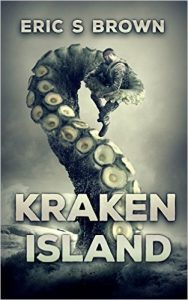 Kraken Island by Eric S. Brown:
Kraken Island by Eric S. Brown:
Colonel Brannon Jackson’s Reapers are the toughest, deadliest, black ops squad that America has at her disposal. When the mission can’t afford to fail, the Reapers are the ones on the sharp end. A group of doomsday cultists determined to bring about the end of humanity is the Reapers’ latest target but this time even the Reapers may not be able to save the world as a prehistoric monster rises to claim the Earth’s seas as its own.
Lord Jonathan Summerton, husband, father, lord of Caswallon and current head of one of the oldest families in the Empire. For too many years, he turned a blind eye to the abuses perpetrated by the Emperor and his followers. But now that his homeworld is under threat, he is no longer willing to stay silent.
Arthur Madden, miner’s son from Askvig IV turned Rebel leader turned most wanted man in the universe. He has dedicated his life to fighting the Empire and putting an end to injustice and inequality. However, in order to achieve that goal, he needs allies, including some who seem to represent everything he fights against.
Alanna Greyskull, former commander in the Imperial Navy. Court-martialled for refusing to scorch a planet full of unarmed civilians, she escaped the firing squad and wound up joining the Great Galactic Rebellion, because there was nowhere else she could go. Ever since then she has been trying to bring some semblance of organisation to the chaotic rabble that makes up the Rebellion, while plotting to make the Empire pay for what was done to her.
When these three meet in a nameless restaurant on the planet Wei Xiu II, lives are changed and history is made and the universe will never be the same…
This is a prequel novella of 24000 words or approximately 82 pages in the Shattered Empire universe, but may be read as a standalone.
The Alliance has toppled the tyrannical empire. It should be a time for celebration, but not for fighter pilot Captain Alisa Marchenko. After barely surviving a crash in the final battle for freedom, she’s stranded on a dustball of a planet, billions of miles from her young daughter. She has no money or resources, and there are no transports heading to Perun, her former home and the last imperial stronghold.
But she has a plan.
Steal a dilapidated and malfunctioning freighter from a junkyard full of lawless savages. Slightly suicidal, but she believes she can do it. Her plan, however, does not account for the elite cyborg soldier squatting in the freighter, intending to use it for his own purposes. As an imperial soldier, he has no love for Alliance pilots. In fact, he’s quite fond of killing them.
Alisa has more problems than she can count, but she can’t let cyborgs, savages, or ancient malfunctioning ships stand in her way. If she does, she’ll never see her daughter again.
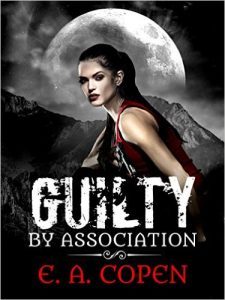 Guilty by Association by E.A. Copen:
Guilty by Association by E.A. Copen:
Everything’s bigger in Texas… Including the monsters.
When a young werewolf is murdered on the Paint Rock Supernatural Reservation, the local cops think it’s a drug deal gone bad. BSI agent Judah Black knows better. An occult expert, she knows magick is at work from the beginning. Using only her wits, knowledge of the supernatural and her limited magickal abilities, she must untangle a web of cover-ups and lies before the killer finds his next victim.
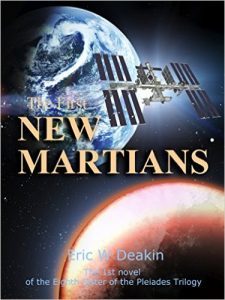 The First New Martians by Eric W. Deakin:
The First New Martians by Eric W. Deakin:
A Novel by Eric W. Deakin about how Humankind began the ascent to the stars via inner space and those who made it possible. How an old soldier, his dog and a young Aboriginal girl, with help from the Axis Engineers, changed the history of humankind forever. How more money than the collective wealth of the entire world was spent on this mission.
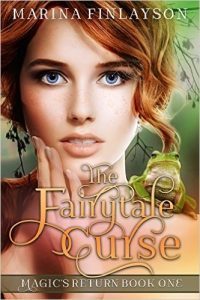 The Fairytale Curse by Marina Finlayson:
The Fairytale Curse by Marina Finlayson:
Most people only wake up with hangovers after parties. Seventeen-year-old Violet wakes up with frogs falling out of her mouth whenever she speaks, and her twin sister CJ’s dripping diamonds with every word. As if starting at a new high school wasn’t hellish enough, they’ve been hit with a curse straight out of a fairy tale, with not a handsome prince in sight.
Apparently Mum and Dad don’t work for the military after all, but for a secret organisation dedicated to keeping the magical denizens of the world safely locked away. These are not the harmless fairies of children’s tales, but powerful beings with a score to settle for their long years of imprisonment. Now the barriers are failing, and if Vi can’t find answers fast the world will be overrun with vengeful fairies. And then there’ll be no happily ever after for anyone.
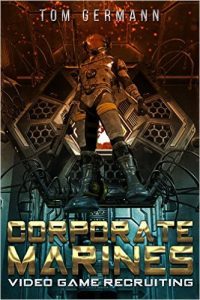 Video Game Recruiting by Tom Germann:
Video Game Recruiting by Tom Germann:
Science Fiction and the Scientists lied…..
There was no golden age of discovery. No FTL or Galactic Federations. At first contact we found out how wrong we had been about the future.
Then a failed alien invasion had crushed our reborn hope.
Tim grew up a normal kid. He went to school and spent time with friends. After all ‘work hard, play hard’ is the way people live now.
All Tim had ever wanted was a nice entry level management position somewhere. Preferably in The Glentol Corporation. He didn’t know that he would become involved in something much bigger.
There have never been many successful candidates for Marine training. The requirements are high and only a few successfully complete training every year. Humanity needs every Marine it has and more.
Tim will be put into a situation where he will discover the sabotage in the recruiting program. Will he be able to expose the cause and fix it? Or will he fail and watch as the experimental video game recruiting process is shut down?
Without the Marines how will humanity survive when the aliens come back?
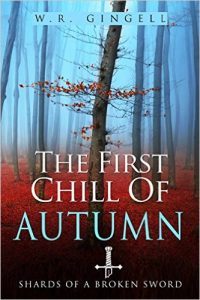 The First Chill of Autumn by W.R. Gingell:
The First Chill of Autumn by W.R. Gingell:
Llassar is an occupied country– but nobody seems to know it.
Fae began to filter slowly into the land shortly after the birth of the crown princess, Dion ferch Alawn, supposedly fleeing a dark threat in Faery known as the Guardians. But that was fifteen years ago, and now there isn’t a town in Llassar that isn’t populated by or under the control of the fae.
Smaller, weaker, and less talented at magic, Llassarians are quickly finding out that there’s no fighting the invasion that crept in so quietly and politely. Even the castle isn’t free of fae: those closest to the king and queen are faery advisors.
When Dion ferch Alawn returns from a carefully sanitised tour of Outer Llassar, the most exciting thing she expects from the near future is the present her twin sister Aerwn promised for their seventeenth birthday.
Then her carriage breaks down, and Dion gets a taste of what the real Llassar has become: desperate, enslaved, and ripe for rebellion. Getting home safely is just the first problem she faces: the real struggle begins when Dion returns to the castle. Her new knowledge is inconvenient and unwelcome– to declare it, treason.
 Carl Sagan’s Hunt for Intelligent Life in the Universe by C. Gockel:
Carl Sagan’s Hunt for Intelligent Life in the Universe by C. Gockel:
Sometimes intelligent life is right in front of your whiskers.
Hsissh is a member of The One. There are some newcomers to The One’s homeplanet. They call themselves “humans,” and they are, frankly, mentally deficient–they can’t warp the quantum world with their minds. However, Hsissh is becoming attached to one of them, a Miss Noa Sato.
When The One decide they will wipe out the humans and Noa’s life is on the line, Hsissh is forced to take sides … he might find intelligent life where The One least expect it.
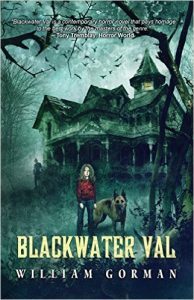 Blackwater Val by William Gorman:
Blackwater Val by William Gorman:
Something isn’t quite right in the Val.
Richard Franklin has left his Midwestern roots behind to live on the coast of Maine with his family. But in the autumn of the year 2000, he must return to his Illinois birthplace on a sorrowful journey. His wife Michelle has been killed in New England by a hit-and-run driver who is never found, so back home he comes with her cremated remains, to fulfill a final wish and on her birthday scatter her ashes in the park along the river in Blackwater Valley—simply Blackwater Val to locals—the small town where they both grew up and fell in love.
With him he brings his six-year-old daughter Katie who still grieves for her lost mother: Katie, who can sometimes guess who’s going to be on the phone before it rings. Who can stop all the clocks in the house, and break up clouds in the sky with her mind, and heal sicknesses, and who sometimes sees things that aren’t there . . . people who are no longer alive. All gifts she inherited from her mother.
Only something isn’t quite right in the Val.
Sinkholes are opening up, revealing the plague pits the sleepy hamlet was built over in the 1830s, when malaria and cholera outbreaks ran riot. Mysterious bird and fish die-offs begin to occur, and Katie can see ghosts of the dead gathering all around. But what she can’t see is the charred, centuries-old malevolence which has been waiting for her, and wants her for its very own. Or the pale Sallow Man who haunts the town’s nighttime streets . . . or the river witch—another Blackwater Val, of sorts—each of whom will be drawn one by one into the nightmarish bloodletting about to take place.
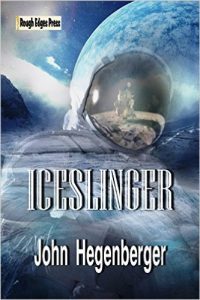 Iceslinger by John Hegenberger:
Iceslinger by John Hegenberger:
A deadly showdown on frozen Ganymede . . . an experiment in time travel that has unexpected results . . . the dead being brought back to life—to sell insurance . . . a legendary villain seeking to summon a strange visitor from another planet . . .
These are only some of the ventures into the fantastic and bizarre to be found in ICESLINGER, the latest collection from acclaimed author John Hegenberger. These classic tales of science fiction and fantasy are filled with action, big ideas, humor, and drama. Step into the many worlds of John Hegenberger and prepare to be entertained!
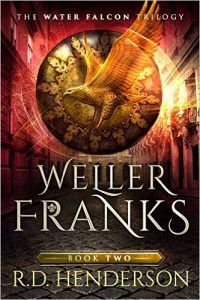 Weller Franks by R.D. Henderson:
Weller Franks by R.D. Henderson:
From the author of the Nambroc Sequence, here is Weller Franks, the second novella in the Water Falcon Trilogy, his next fantasy series.
Weller Franks, a dark gnome, owes a great deal of money to a halfling crime lord named Tom Bolden who operates in the Fairy Realm.
Franks desires nothing more than getting out from underneath the thumb of Bolden, disposing of the Franks persona, and return to his old life as a smuggler on the high seas in the Earth Realm.
While Weller dreams of his old life, the gnome works as a portal operator for Portal Travel, Inc. which is a company that takes passengers and cargo from one realm to another. Traveling by portal is the only mode of travel between the realms, and Portal Travel, Inc. is the only company that provides this service.
Sometimes, Tom or one of his underlings would order Weller to smuggle, narcotics, illicit magic items, and unregistered weapons in his portal which is a crime.
Weller is not so much bothered by committing crimes when his smuggling contraband in his portal. The gnome, however, is very hot and bothered that he is not getting a larger percentage from each illicit transaction. The problem also for the gnome was the more revenue he generated for Tom did not necessarily mean the amount of money he owed the halfling is getting less.
After doing some good work for Tom, but still owing money to the halfling, Weller is told that he would be returning to the high seas and would be able to get rid of the Weller Franks persona. The gnome should be estatic and happy that his dreams become a reality, but he is not. Why is that?
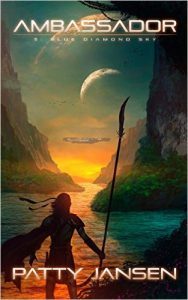 Ambassador: Blue Diamond Sky by Patty Jansen:
Ambassador: Blue Diamond Sky by Patty Jansen:
As Cory takes a well-earned rest and finally submits to proper weapons training, he and a couple of people from his household go on a hunting trip in the marshland between Barresh and the turquoise sea. A bad storm has come through recently and on a deserted beach, Cory finds something Earthly that doesn’t belong there: a message in a bottle, a piece of paper with HELP scratched on it with a sharp object. In Isla.
Cory has a list of all humans in Barresh: it’s very short and no one is missing. A few days later, he receives a curious message through official channels, from a woman on Earth whose rich businessman husband went on a trip of a lifetime “in a place where you can surf with plesiosaurs in turquoise waves”.
Cory knows the guy advertising the trip. He’s a shady character. He also knows where the “plesiosaurs” are. They’re not particularly friendly. Not to mention that the area is on the land of a viciously territorial Pengali tribe.
As it turns out, those are the least of his worries.
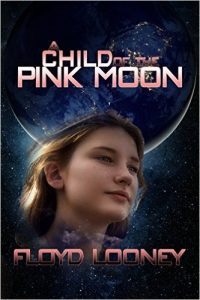 A Child of the Pink Moon by Floyd Looney:
A Child of the Pink Moon by Floyd Looney:
Nel is an ordinary seventeen year old, worried about her super-powers, scared that she could be drafted and the possibility of a deadly showdown with her stalker.
Nel has been in institutions most of her life, since her family gave her up when she exhibited signs of having super powers. Now there are super-powered teenagers around the world being drafted by governments for combat. While the world rushes into super-powered warfare, Nel must deal with a super-powered stalker who wants to kill her.
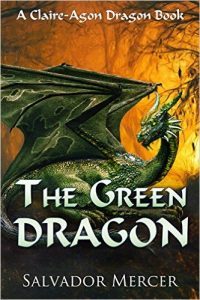 The Green Dragon by Salvador Mercer:
The Green Dragon by Salvador Mercer:
A thousand years ago, on the world of Claire-Agon, a war raged between men and dragons.
In Vulcrest, nearly a century before the Great Dragon War, a boy’s life was changed forever. Sheltered by a Druid of the Arnen, Elly Brown was raised in the druidic order destined to confront his childhood terror and become one of the most feared defenders in all of Agon, Elister the Druid.
Near the heart of Vulcrest’s Greenfeld Forest, the heir to the throne, Helvie, and her Paladin protector, Fist of Astor, Lucina, investigate a strange series of murders while the sinister Kesh ally with Vulcrest’s ancient enemy, the realm of Ekos in an attempt to dominate the frontier realm, laying siege to its capital, Vulkor.
Facing the destruction of her realm, Helvie must unite with an unlikely group of companions to free her homeland, but a deadly, ancient, woodland nemesis has other plans.
Helvie soon discovers that, in the world of Claire-Agon, when dealing with a Green Dragon, sometimes rules were meant to be broken.
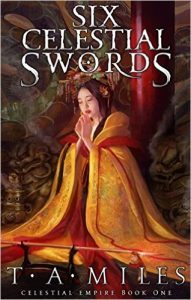 Six Celestial Swords by T.A. Miles:
Six Celestial Swords by T.A. Miles:
Inspired by the rising chaos in Sheng Fan, Xu Liang, mystic and officer of the Imperial Court, leaves his homeland for the barbarian outer lands in search of four magical blades to unite with two sacred weapons already in the possession of the Empire. His plan is to bring all of the blades together and return them to Sheng Fan’s Empress as a symbol of unity that will bolster the people’s faith in the Imperial family and assist against the surge of dark forces.
Before Athena Lee and the worlds that she knew there was an embattled Earth.
Earth was in turmoil before the first colony ship was launched. The Cyber Wars raged across the planet as country battled country. The war was fought until only the Major Powers were victorious. In the aftermath, the United Nations came into it’s own. Warriors, trained and bred to be the best the world had ever seen emerged from the shadows, bringing order and control out of the chaos of the Cyber Wars. Sam was one such warrior. Born and bred to serve he followed his orders and became one of the best pilots in the service. The future of man lay in the stars. Colonization was a good way to rid society of the undesirables of Earth. He volunteered to start a new colony and spread Earth’s power.
This is the Prequel for the Athena Lee Chronicles.
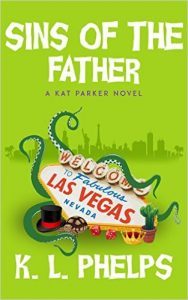 Sins of the Father by K.L. Phelps:
Sins of the Father by K.L. Phelps:
Kat Parker was looking forward to a nice normal night out with her boyfriend—though nothing is truly normal when you can see and talk with the dead. However, when Damian arrives with news that his estranged father has been killed, date night quickly turns into a trip to Vegas, the supernatural capital of the world. Whoever said romance was dead?
As a former detective for the Vegas Police Department, Damian is well aware of his father’s shady business dealings, but he’s still surprised when he’s confronted by an unstable squid-faced creature demanding he deliver on his father’s final deal.
With time running short and the creature’s patience running even shorter, Kat must help to figure out who killed Damian’s father and how to deliver on his final debt. Otherwise, Kat may have more to worry about than playing middleman to a postmortem family reconciliation or figuring out if her pet turtle has a gambling problem.
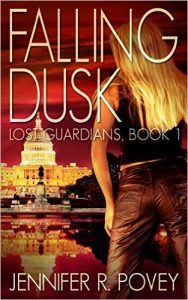 Falling Dusk by Jennifer R. Povey:
Falling Dusk by Jennifer R. Povey:
Anna McKenzie just wants her life back. She wants the brutal murder of her brother never to have happened. She certainly doesn’t want magic, power, and to deal with a certain vigilante named Victor Prince…
…but once the world of magic has claimed her, there is no escape.
Jilted by his Royal fiancee, captain Tanner Scott is assigned to Eons and the newly constructed RIM Naval Academy buildings and the duty is anything but a reward. His days are full of squabbling University professors and construction types all nitpicking for changes to plans and additions and extra and the boredom of detail is a horrible side-effect.
As he learns, there is more to looking after a successful construction project than being at the top of the heap and the machinations of the Issians who run Eons and it’s mind-readers comes to him for help. He knows that the Baroness is somehow also involved but the openness of the Master Adept and her Inner Circle that controls Eons is what is so surprising to him.
As the Naval Academy is finally ready to open and the heads of state of many of the RIM Confederacy planets arrive, the protesters against the Issians make their play to publicly humiliate the Inner Circle and their own plans to strengthen their ranks via the death of twins and Tanner must find a way to quell the uprising…
Someone was setting fire to the Commonwealth Rim, nurturing a storm to drag humanity through the horrors of colonial warfare and thereby hasten the rise of Empire. Their plan had just one fatal flaw: it didn’t count on an ex-Marine pathfinder with a grudge, a dagger and a deadly partner. Zack Decker had seen enough of war to know this one had to be stopped before it turned into an all-out bloodbath, even if that meant ignoring orders and risking his mission as well as his life. After all, he was still one of the Few…
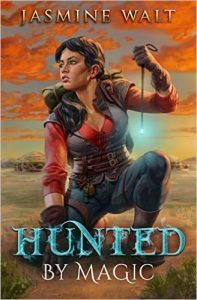 Hunted by Magic by Jasmine Walt:
Hunted by Magic by Jasmine Walt:
With the sudden disappearance of Iannis, the Chief Mage, Solantha has erupted into pandemonium. Citizens are rioting in the streets, the Mages Guild is on a misguided warpath, and shifters and humans are fleeing the city in droves. Ridden with guilt, Sunaya defies the Mages Guild and goes off in search of Iannis, trekking into dangerous, uncivilized territory to try and make things right. But Sunaya’s relationship with Iannis isn’t the only thing at stake — if she doesn’t find him soon, the Resistance might just succeed in plunging the Northia Federation into a devastating and bloody civil war.
The vengeful ghost of a murdered girl stalks the innocent. A forbidden passion ignites in the dark. Secrets of the past that doom the present rise with the dead at Eden Lake.
For Nikolai and Alexei, their jobs at Camp Nevele were supposed to be a break from real life, a last deep breath of freedom before returning to their family and the traditional marriages arranged for them. But the peace of the summer is shattered when the ghost of a brutally murdered girl begins to kill.
Even within his Romany family, Alexei has always been different. Gifted with the sight, he’s lived his life knowing something dark hunts them. A being from the otherworld unwilling to stop until it gets what it wants…and what it wants is Nikolai.
As the boys struggle to put the spirit to rest before it kills again, they find it harder and harder to deny the passion burning between them.
Despite the deep taboos of their upbringing, desire ignites between the young men and they are left with a devastating choice between holding on to each other and losing everything they’ve ever known. But the very love that binds them together may separate them forever and the choice may not be theirs to make.
Fans of the supernatural and passionate stories of first love will fall in love with the fantasy romance of Nikolai and Alexei and their desperate struggle to stay together.
 Send to Kindle
Send to Kindle
May 29, 2016
Alarm für Cobra 11 and the Lester Dent Pulp Fiction master plot
I quite like Alarm für Cobra 11, a German TV show of about two highway cops (Turkish-German cop Semir Gerkan, played by Erdogan Atalay, and a succession of partners) and their cases, that has some of the best vehicle stunts this side of a Hollywood blockbuster with a nine digit budget. In fact, I have blogged about the show before, though I drifted away when Alarm für Cobra 11 suddenly became all grimdark and depressing from season 19 on due to a new showrunner who thought he was making Breaking Bad rather than escapist fare with lots of explosions and completely ruined the mix of humor, banter and non-stop action that made Alarm für Cobra 11 what it was.
I apparently wasn’t the only one who disliked the new “adult” direction of the show, because the viewing figures fell. The production company reacted and the showrunner was sacked along with the actor who played Semir’s latest partner during the problematic seasons (though IMO the actor is not to blame for issues with the script). Meanwhile, the events of the grimdark seasons (most notably the collapse of Semir’s long and previously completely happy marriage) were retconned, never to be mentioned again.
So far I like the new direction or rather the return to the old Alarm für Cobra 11 I enjoyed. I also like Semir’s new partner Paul Renner, played by Daniel Roesner, who had previously appeared in a different role in the show (and they are different characters, even though both are young cops who idolize Semir). Some of Semir’s previous partners have tended to come across as underdeveloped (ironically Alex Brandt, who had to leave because of the falling viewing figures, was not one of them), therefore I’m pleased that we got to see Paul’s family – his father, a car mechanic with early onset dementia, and his precocious niece – in one episode.
Now Alarm für Cobra 11 has always been a formulaic show to the point that you can pretty much predict the beats. It always starts off with a few minutes of Semir and Paul in their car bantering, then there is a huge spectacular car crash on the highway that is usually tied to some kind of crime. Paul and Semir investigate, which usually leads to two smaller action scenes (often chases, sometimes also shoot-outs), until the fiery finale with yet another spectacular stunt sequence, usually but not always a massive car crash. It’s clearly a formula that works, as evidenced by what happened when the screenwriters deviated from the established formula during the grimdark interlude. What is more, the show managed to offer just enough twists and turns and variations on this formula to remain enjoyable escapist viewing.
However, while watching both the new episodes and the repeats (of a pre-grimdark-interlude episode) broadcast right thereafter, I noticed something that had never occurred to me before. Alarm für Cobra 11 is not just formulaic – no, it even follows a vry specific formula for writing popular fiction. A formula that’s older than pretty much everybody involved in the show, namely Lester Dent’s pulp fiction master plot.
Lester Dent was a prolific pulp author, best remembered today as the creator and writer of Doc Savage. If Doc Savage had been all he wrote, Lester Dent’s influence on popular culture would still have been assured, for not just is Doc Savage a.k.a. the Man of Bronze often considered to be one of the main inspirations behind Superman – no, Doc’s aides, five highly accomplished (and constantly bickering) specialists plus two pets plus Doc’s impressive cousin Pat, are the direct forerunners of the supporting teams/casts of pretty much every pop culture hero these days. You can see the influence of Doc Savage and his fabulous five (six, if you include Pat) in anything from The A-Team via Buffy via any number of CSI/NCIS variations via Torchwood via Castle to modern superhero movies/TV shows (it’s particularly notable in DC’s TV shows, where Arrow/Flash/Supergirl all have their own support teams).
However, in addition to creating Doc Savage and his pals, Lester Dent also came up with a plot template for a 6000 word pulp short story that is supposed to work for any genre. The entire thing, which apparently started life as an article in a writers’ magazine in 1939, may be found here, while Michael Moorcock’s application of Lester Dent’s formula may be found here. It’s well worth reading, even if you’re not a writer or a writer who doesn’t much like formulas.
To sum it up, Lester Dent advises writers to divide a story into four parts with increasingly escalating stakes and end every part with a revelation/reversal that sends the story off into a new direction. Dent also advises writers to introduce every character, plot point or theme that will eventually contribute to the resolution early on and reminds them to be original by having a different murder method, a different setting or a different treasure for the villains to be after. In short, Lester Dent’s pulp fiction master plot boils down to advice that makes sense even if you don’t actually want to follow his template.
Now let’s see how Lester Dent’s pulp fiction master plot applies to Alarm für Cobra 11. If you want to take a look at the show, a whole bunch of episodes both past and present are available for free online here. Avoid season 19 and 20, those are the grimdark seasons. Come to think of it, the grimdark episodes start halfway through season 18, when Semir’s old partner André returns from the dead to be revealed as a villain and Semir breaks up with his wife.
As I’ve said above, every episode of Alarm für Cobra 11 can be divided into four parts, which map quite neatly onto the four parts of Lester Dent’s pulp fiction master plot. Every one of those four parts/acts is punctuated by an action sequence, since spectacular stunts are the show’s raison d’etre, and also ends with a revelation that sends the plot off into a new direction. So far, pure Dent.
Establishing all important characters, plot points and themes early on, preferably in the first third, is pretty much standard for popular television of any kind these days and Alarm für Cobra 11 mostly hits that requirement, though I recently saw one episode which switched to a different villain (boss of the initial villain) towards the end.
The writers of Alarm für Cobra 11 also take care to serve up the various different things Lester Dent suggested. Different locales are difficult to do within the framework of show, first of all because of filming limitations and secondly because for a show focussed on two highway cops, it’s clear that a big chunk of it will take place on or near highways. The murder methods vary, though a lot of the episodes involve victims getting shot, stabbed, poisoned or dying in car crashes (well, it is a show about highway cops, remember, so car crashes feature prominently), frequently after having been shot or stabbed. Though the show also has a thing for apocalyptic terrorist plots involving poison gas, dirty bombs or botulinum toxin in the water supply, which is also when the show venture into SF territory.
However, the “different” on which Alarm für Cobra 11 places a big focus is the “different treasure for the villains to be after”. In the episodes (both new and repeats) broadcast during the most recent run, the treasures the villains were after included a rare vintage car which turned out to be used for smuggling, a supply of botox (for poisoning the water supply), nuclear waste (for building a dirty bomb), stolen and smuggled Syrian antiques, a contested piece of real estate, stolen high tech weaponry, babies kidnapped for human trafficking, mysteriously vanishing ransom money as well as the more common drugs, diamonds and money. And even the most recent new episode where the prize was indeed money put something of a twist on it, since the villains were looking to steal money from a government depot where it’s stored for cases of war and other national emergencies.
So Lester Dent’s lessons on writing pulp fiction stories are still put to good use almost eighty years after he first wrote them down to keep a rather formulaic TV show fresh after twenty years on the air. Another thing that helps to keep Alarm für Cobra 11 fresh is that several episodes of the most recent run focus less on the two leads (and for the new episodes, it’s notable that we don’t know a whole lot about Paul yet), but on supporting characters like forensics specialist Hartmut, junior police officer Jenny, veteran highway cop Bonrath (who was given a touching romance with former 1980s sexpot Sonja Kirchberger in a recent episode) and Kim Krüger, Semir’s and Paul’s (and in earlier episodes Ben’s) long suffering boss.
The Lester Dent pulp fiction master plot – still effective after almost eighty years.
 Send to Kindle
Send to Kindle
May 16, 2016
Cora guest-blogs elsewhere – and some thoughts on dialogue as characterisation
First of all, I have a guest post in the “Nobody Knew She Was There” series about female SFF writers over on Sarah Ash’s blog today. I talk about the challenges of being a woman from a non-anglophone country who writes SFF, so head over there and check out it.
And also read some of the other great posts in the series by writers such as Kari Sperring, Juliet E. McKenna, Stephanie Burgis, Jessica Rydill, Freda Warrington, Jenny Barber, Jan Edwards and others, while you’re at it.
In other news, today I came across this Storify of a Tweetstorm (i.e. a whole lot of Tweets) by Chuck Wendig about writing dialogue, which resonated with me a whole lot.
Now anybody who has ever read any of my stories probably knows that I write a lot of dialogue. For example, the Helen Shepherd Mysteries are about eighty percent dialogue, since Helen solves her cases primarily by talking to witnesses, suspects and of course the members of her own team. Yes, there are all sorts of clues and red herrings, but even those are usually presented in dialogue.
The late Jay Lake once said that all writers begin with different skill sets, aspects of writing they are naturally good at (basically what came in the box) and others they need more time to learn. For me, dialogue was something I was really good at from my very first attempts at writing on. I’m not sure why, though I suspect having spent years holding conversations with imaginary characters and sometimes writing them down helped a lot. Cause by the time I started writing in earnest, I had already spent a lot of time practicing how to write dialogue.
There is a school of thought that believes that any “fluff” in a story should be cut. And any dialogue that does not directly impact the plot is often considered “fluff” and gets cut, often leading to very formulaic stories.
And indeed the fact that we can no longer have any fluff is one of the reasons why TV shows are so damned predictable these days. Because every line, every single word has to serve a purpose, you automatically know that the throwaway line of the police chief about a wave of burglaries on XXX Street or the prison guard’s phone call to his wife in the background will inevitably turn out to be a vital clue to solving the case. Because in a modern crime drama, there never are any throwaway lines anymore. No one ever has a conversation that does not directly pertain to the plot. Fluff must be cut, everything must serve a purpose. Coincidentally, this is also why so many works these days fail the Bechdel test. Because any character and any sort of conversation that has no direct impact on the plot is cut.
Now Chuck Wendig does come out against throwaway lines and agrees that dialogue should move the story forward (so do I BTW). But there is more than one way of moving a story forward. And even dialogue that doesn’t do much to progress the plot can still reveal a whole lot about the characters and their relationship to each other. And it’s these character moments that are often lost when cutting all the fluff and the chit chat.
When Helen Shepherd interviews a witness and/or suspect, Helen and through her the reader not only learns facts as what did the witness/suspect see and do they have an alibi, but she and the reader also learns a lot about what sort of people these characters are and what their relationship is to the victim and to each other. Indeed, in an upcoming Helen Shepherd Mystery called Chamber Play, I have the stereotypical “all the suspects gathered in one room” scene so beloved of traditional and cozy mystery writers. And once I started writing that scene, I also realised why they are so popular to the point of cliché. Because the various suspects immediately started arguing and accusing each other so that Helen didn’t even have to ask any questions, she only had to listen. It was like magic.
In fact, most of my stories – and I go into that in my guest post over at Sarah Ash’s blog as well, since that’s not how “real” SFF writers are supposed to write – start with a character or two. I put these characters together, let them talk and see what happens. New York City’s Finest started out this way. I used a prompt from the They Fight Crime generator (which is awesome for these things), put Detective Ray McCormick into Jo’s taxi and let them talk. And lo and behold, this little conversation blossomed into a novelette with series potential (I’ll revisit Jo and Ray eventually, since I really like them).
Of course, it helps that plot is another thing for me that “came in the box” to quote the late and much missed Jay Lake. I’ve always been good at telling stories – probably due to consuming a whole lot of them – to the point that I even imposed a plot and dialogue on plotless vignettes I was supposed to write for creative writing class, since vignettes with lots of evocative description is one of the things I did not get in the box, but a skill I had to acquire. So when I put two character together in a room and let them talk, they usually generate a plot.
Though there are also exceptions. History Lesson, part 3 in the Shattered Empire series, basically has no external plot. All that happens is that Holly and Ethan sit in a room, get drunk, eat mint candies and talk. And indeed the fact that I write a lot of food scenes is largely due to the fact that I write a lot of dialogue, because eating and drinking are ideal for breaking up dialogue. Just take care not to give your characters alcohol poisoning by accident.
Now all Shattered Empire stories are dialogue heavy, but History Lesson really takes the crown here, because it’s almost all dialogue – for 13000 words. However, I have never had a single complaint about that story – even though nothing external happens – because all that dialogue serves a purpose and we learn a whole lot about Ethan and Holly (and a bit about Carlotta who shows up near the end), about the illustrious Summerton family and about the universe they live in, including the history of the Fifth Human Empire as narrated by Ethan (which bears some uncanny similarities to the history of postwar (West) Germany and I’m still waiting for someone to call me out on that). The upcoming Shattered Empire prequel novella Conspirators is mostly dialogue as well – with a fight scene against blaster-toting robot waiters in the middle.
To quote Chuck Wendig again:
And really, plot is character. Unless you're writing about natural disasters, plots happen because characters make and act on decisions.
— Chuck Wendig (@ChuckWendig) May 12, 2016
Plot is what results from the push-and-pull of characters (and their words, actions, and agendas) operating with and against one another.
— Chuck Wendig (@ChuckWendig) May 12, 2016
I'll say only this one more thing: plot is best when it follows characters, not when characters follow it. Dialogue is part of this.
— Chuck Wendig (@ChuckWendig) May 12, 2016
I completely agree. When you let the characters follow the plot, you get those weirdly formulaic TV crime dramas, where sometimes even established characters are distorted just to make the plot work. So I vastly prefer just letting the characters take the lead – never mind that mine tend to balk when I try to make them do something they don’t want to. And dialogue is of course excellent for revealing character.
I’ll finish with talking about a new project I’m working on, also a space opera with a strong romance subplot, but not set in the Shattered Empire universe, because it wouldn’t have worked. Now space opera is a very action-oriented subgenre – particularly the Nutty Nuggets fraction wants its manly space marines doing manly things in space and heaven help an author, if there’s too much talk or introspection or – gasp – romance. Don’t you know that you’ll never get in the Amazon top 100, if you write that sort of thing?
Now the protagonists of the upcoming series are two soldiers, which should assure plenty of Nutty Nuggetty action. Only that these soldiers don’t meet on the battlefield, but while on leave on a tropical pleasure planet, i.e. not exactly the most action-packed environment. And yes, there is action. There is a fight and there will eventually be a second one, once I get around to writing it. There is also an interlude, where our heroes go sailing and get caught in a storm. But most of story – and I suspect it will be around 60000 to 70000 words when done, i.e. short novel length – the protagonists eat, drink, dance and talk a lot. They talk and get to know each other and are heavily attracted to each other, which is going to be a problem, because one of them is not what they claim to be. And indeed this is why I deliberately went for so much dialogue – or rather overrode my own objections of “You can’t do this. No one will want to read it.” – because I want the reader to get to know these characters and eventually fall in love with them, just as they fall for each other. Because that will make the inevitable betrayal at the end hurt so much more.
Meanwhile, in the sequel – and since the first book will end on something of a cliffhanger, there needs to be a sequel – there’ll be some action in the form of interrogations, escape attempts, fights and even a space battle. But again, a lot of the story will involve the protagonists talking (and mean author that I am, I of course dump them in a situation where they have a lot of time to talk), gradually getting to know each other again and trying to figure out how much of their previous encounter was lie and how much was truth. What is more, one of the protagonists has some massive atonements to make, while both have to do some soulsearching.
Will this appeal to the Nutty Nuggets crowd? Probably not. But as I said over at Sarah Ash’s blog, I can only tell my own stories, not somebody else’s. And my stories tend to have a lot of dialogue.
 Send to Kindle
Send to Kindle
May 15, 2016
The 2015 Nebula Awards, the Bram Stoker Awards, the Eurovision Song Contest… and a bit about football
So the Eurovision Song Contest was last night. I was watching something else and occasionally switched over, only to decide that I really could not bring myself to care. I finally tuned for the voting only to realise that a) they had changed the voting system and announced first the jury votes in the regular way and then the collated televoting results. Personally, I prefer the old system. Okay, so they apparently wanted to defuse the political nature of the televoting results, but it’s not as if the jury votes aren’t political or as if the whole thing isn’t political in general.
Case in point: Germany finished last for the second time in a row. And unlike last year, where the German song did not even have a whole lot of backing in Germany itself, this year’s entry – “Ghost”, sung by 18-year-old Jamie-Lee – had a lot of popular support. Jamie-Lee was the runaway winner of the German primaries and she’d previously won the German edition of The Voice. I don’t think anybody really expected her to win Eurovision, but everybody expected her to at least place decently.
Okay, so she did have a weird manga-inspired outfit, but there were plenty of equally weird outfits (e.g. the Croatian tree dress, the Polish ringmaster vampire or the Armenian reject from the Black Widow program), so that a girl who looks like a cosplayer at an Anime con doesn’t really stick out all that much. I have heard from some older viewers that they had problems with Jamie-Lee’s outfit (i.e. they didn’t understand it, because they have no idea what mangas or anime are), but these were inevitably the sort of people who also hated the fact that she sang in English like eighty percent of the contestants. And the monolingual defenders of the German language don’t matter and never did.
One potentially problematic aspect is that Jamie-Lee is a white German teenager appropriating Asian culture, but considering we’ve seen all sorts of blatant cultural appropriation at the Eurovision Song Contest before, I doubt that was the deciding factor.
So if there was nothing wrong with the song and the singer, the obvious answer is that bad result for the German entry was due to political reasons. Because apparently, the rest of Europe hates us because of we insist on responsible fiscal policies or because we take our responsibility to help the refugees displaced by other people’s wars seriously, unlike certain other countries, or because they hate Angela Merkel, the best chancellor we’ve had in decades, or because… well, honestly, I no longer care. By this point, I think the German broadcaster ARD should simply get out of both the Song Contest and the European Broadcast Union altogether. Because I don’t see why we should have to pay for the privilege of having 18-year-old girls publicly humiliated. I’m not the only one who thinks so either, here is an article which compiles a bunch of confused and angry social media reactions.
Ukraine won by the way with a singer called Jamala performing a song called “1944” about the expulsion of the Crimean Tartars under Joseph Stalin. Okay, so it wasn’t an okay song and clearly heartfelt, especially since singer Jamala drew on her own family history. But don’t believe for a minute that this wasn’t a political vote, especially since Australia was leading after the jury voting (and IMO had the better song). And of course, Russia is thoroughly pissed off (even though their televoters gave Jamala ten points), especially since their contestant only landed in third place, and are threatening to boycott the contest next year. Meanwhile, in the rest of Europe the reaction is, “Yes, please, do, cause we’re kind of tired of your blatant campaigning for a win.”
In better news, Werder Bremen will remain in the first German league after a last minute win against Frankfurt.
Also in better news, the winners of the 2015 Nebula Awards were announced tonight and they look very good.
“Hungry Daughters of Starving Mothers” by Alyssa Wong, winner in the short story category, and Binti by Nnedi Okorafor, winner in the novella category, are both very fine stories. Binti was on my Hugo nomination list, while “Hungry Daughters of Starving Mothers” made my personal longlist. I haven’t read “Our Lady of the Open Road” by Sarah Pinsker, the winner in the novelette category, because it’s not available online as far as I know, but I know that the story has gotten a lot of positive reactions. Correction: I just checked and “Our Lady of the Open Road” is available online here, if you want to read it.
ETA: Here is Alyssa Wong’s acceptance speech, courtesy of her blog.
I haven’t read Updraft by Fran Wilde, winner in YA category, yet, though I’ve heard a lot of good things. As for Uprooted by Naomi Novik, winner in the best novel category, so far I haven’t been overly interested in the book for the reasons outlined here (short version, contains too many “Not my things”), but it’s a novel that has gotten a lot of buzz and is clearly a worthy winner, even though Brandon Kempner of Chaos Horizons and Ceridwen Christensen of the Barnes & Noble blog both predicted that The Fifth Season would win. And who knows, once the Hugo voters’ packet goes online, I may well realise that Uprooted is my thing after all.
That leaves Mad Max: Fury Road in the best damatic presentation category, another worthy winner, which – let’s not forget – was also the big winner at the Oscars this year. Rounding out the 2015 Nebulas, C.J. Cherryh was deserved named SFWA Grandmaster and the two special awards went to the late Sir Terry Pratchett and Lawrence M. Schoen respectively.
So all in all, some very fine winners at the 2015 Nebula Awards, even if not every winner would have been my first choice in the respective category. There is a discussion of the winners in the comments at File 770 BTW. Comparing the Nebula winners with the 2016 Hugo shortlist, you’ll notice that the winners are fairly well represented with Uprooted, Binti and Mad Max: Fury Road all nominated in the respective categories and Alyssa Wong, author of “Hungry Daughters of Starving Mothers”, nominated for the John W. Campbell Award. The only Nebula winners conspicuously absent from the Hugo shortlist are Updraft, which isn’t that much of a surprise, since the Hugos don’t have a YA category and YA usually has a hard time getting nominated in the regular categories, and “Our Lady of the Open Road”, which may well have been a casualty of canine interference.
Both Joel Cunningham at the Barnes & Noble blog and Andrew Liptak at io9 also point out that the winners of the 2015 Nebula Awards are all women with the sole exception of the dramatic presentation category, in which a movie which featured a plethora of well-drawn and interesting female characters won, even though the nominal protagonist was a man as were the director and writer.
What is more, two of the 2015 Nebula Award winners are women of colour and two of the winning stories feature queer characters and were written by queer authors, at least according to Andrew Liptak. Add in that the Grandmaster Award also went to a woman, the great C.J. Cherryh, and the 2015 Nebulas are a triumph of diversity and a reflection of the changing demographics of the SFF genre. And given the controversy that has been engulfing the Hugo Awards these past three years, this is a very encouraging sign. Yes, the Hugo Awards may be besieged by reactionaries, but they don’t speak for the rest of us.
Talking of which, I was curious and checked out some puppy-affiliated blogs for reactions, since I suspect that whining canines are not exactly happy with this year’s Nebula Award decisions. Most are conspicuously quiet, though Brad Torgersen, spokesperson of last year’s Sad Puppy campaign, laments that Mad Max: Fury Road won over his personal favourite The Martian, which he views as yet another sign of the decline of the genre.
Now I get that Brad Torgersen really, really loved The Martian, ironically for the same reasons that I don’t care for it (the movie was okay, largely due to the excellent actors, but the book was just dull), namely that it feels like a throwback to the 1950s/early 1960s. Now Mad Max: Fury Road is a throwback itself, namely a continuation of a franchise from the 1980s and a return to the trendy punk post-apocalyptica of the time. But Mad Max: Fury Road – which I initially filed under “sequel no one asked for” when it was announced – managed to update its narrative for the 2010s, while The Martian still feels very much like a 1950s/early 1960s work, even though the cast of both book and movie is a lot more diverse than it would have been back then and the special effects are a lot better as well.
As for why Mad Max: Fury Road winning over The Martian is a sign of the decline of the genre, Torgersen points out that The Martian features a positive future you would want to live in (unless you’re Mark Watney stuck on Mars, I suppose), while no one in his right mind would want to live in the world of any of the Mad Max movies. He’s actually right on that point, but it’s still the Ray Bradbury Award for best dramatic presentation and not the award for the best future world to live in. He also points out that The Martian made a lot more money at the box office than Mad Max: Fury Road, which in the “earnings are everything” world of the Sad Puppies must mean that it’s the better movie. But if the Nebula were awarded according to earnings than The Force Awakens should have won, because it outgrossed everything else on the shortlist. Never mind that Mad Max: Fury Road had the misfortune of being released sandwiched between two huge blockbusters in a crowded summer, while The Martian was released in a much less crowded environment. Plus, The Martian was very much marketed at a general audience, whereas Mad Max: Fury Road was clearly aimed at genre viewers. Coincidentally, my personal favourite in the best dramatic presentation category would have been a tie between The Force Awakens and Jessica Jones (haven’t seen Ex Machina yet and don’t care for Pixar’s stuff at all), though I’m perfectly happy with Mad Max: Fury Road as well.
As for the swipes against humanities graduates ruining the genre, because they don’t understand science, can we please just stop it? An author’s educational and professional background does not say anything about the quality of their work. There is an odd insistence in parts of the SFF sphere that “real scientists”, “real engineers” and “real soldiers” (if we’re talking about military SF) make better SFF writers because of their background. This is of course bullshit, because a) there is such a thing as research (just ask Andy Weir), b) having a humanities degree (or indeed no university degree at all) does not necessarily mean that you don’t understand science and c) it’s fiction, i.e. it’s all made up anyway. We don’t insist that mystery writers should be police officers or criminals, that historical fiction writers should be historians or that romance writers should be relationship counsellors or at least happily married. Fantasy writers usually aren’t knights, wizards or demon slayers in real life either. So why the hell is an author’s day job so important in science fiction?
While on the subjects of awards, the HWA also announced the winners of the 2015 Bram Stoker Awards yesterday. Now I’m not all that familiar with the winners, since horror isn’t really my genre, though Andrew Liptak gave the winner in the best novel category, A Head Full of Ghosts by Paul Tremblay, an excellent review at io9. I’ve also heard praise for Mr. Suicide by Nicole Cushing, winner in the first novel category, and the movie It Follows, winner in the screenply category. What is more, we featured Mercedes M. Yardley, winner in the long fiction category, over at the Speculative Fiction Showcase (though with a different title), where we also featured several works published by Crystal Lake Publishing, who published the winner in the poetry category.
Finally, the winners of the Bram Stoker Awards also have a good gender balance, particularly considering that horror is even more male dominated than science fiction.
So in short, yesterday saw some excellent works win awards and Werder Bremen stay in the Bundesliga. Pity about Eurovision.
Comments are closed, because SFF awards discussion generally brings out the trolls and Eurovision fans can be nasty as well. Ditto for disgruntled football fans.
 Send to Kindle
Send to Kindle
May 14, 2016
New Story Available: The Death of the American Dream
I have a new release to announce. It’s called The Death of the American Dream and it’s basically Mad Men meets the apocalypse, complete with giant mutant crabs and other monsters.
This is another story that was inspired by a piece of SFF artwork, in this case a painting called “Fatigue” by artist John Brosio. Brosio also has another painting called “Fatigue”, which came up during an image search and promptly influenced the story as well. In general, I like using images – often SFF art – for inspiration and have a whole folder full of intriguing images for that purpose. Occasionally, when I’m blocked and looking for inspiration I go through that folder, pick an image and start writing about it.
And since I was watching the final season of Mad Men, while I was writing The Death of the American Dream, the show combined itself with the nascent story.
You can find the result below. I hope you like it.
The Death of the American Dream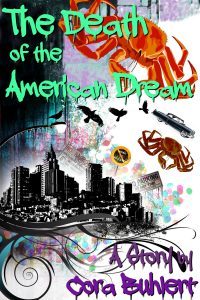 They came out of nowhere to attack America’s towns and suburbs: Giant mutant crabs and other creatures, grown to enormous size due to nuclear radiation and bent on destroying the American way of life. But while many fall to the monster attacks, an advertising executive finds the unexpected strength to survive and fight back for the sake of his family…
They came out of nowhere to attack America’s towns and suburbs: Giant mutant crabs and other creatures, grown to enormous size due to nuclear radiation and bent on destroying the American way of life. But while many fall to the monster attacks, an advertising executive finds the unexpected strength to survive and fight back for the sake of his family…
This is a short story of 5300 words or approximately 20 print pages.
More information.
Length: 5300 words
List price: 0.99 USD, EUR or GBP
Buy it at Amazon US, Amazon UK, Amazon Germany, Amazon France, Amazon Netherlands, Amazon Spain, Amazon Italy, Amazon Canada, Amazon Australia, Amazon Brazil, Amazon Japan, Amazon India, Amazon Mexico, Kobo, Barnes & Noble, Apple iTunes, Scribd, Smashwords, Inktera, txtr, Thalia, Weltbild, Hugendubel, Buecher.de, DriveThruFiction, OmniLit/AllRomance e-books, Casa del Libro, Flipkart, e-Sentral, 24symbols and XinXii.
 Send to Kindle
Send to Kindle
May 8, 2016
And even more Hugo links – and the Locus Awards
The 2016 Hugo debate is still going on, which isn’t surprising, since last year it lasted all the way until the winners were announced in August, whereupon it morphed into a debate of the winning works. What is more, we’re having a debate about the Locus Awards as well.
For my own contributions so far, see this post, this post and this post. For even more Hugo links, including links to Puppy spaces, also check out File 770.
For starters, the 2016 Hugo Ballot has been updated with the replacements for the two dropped out finalists, the short story “The Commuter” by Thomas A. Mays and the fanzine Black Gate. The new Hugo finalists are “Cat Pictures, Please” by Naomi Kritzer in the short story category and Lady Business in the fanzine category. Both are excellent choices IMO and were also on my own nomination ballot (so was Black Gate which dropped out BTW).
The ladies of Lady Business react to their Hugo nomination and also offer links to several 2015 posts of note, while Naomi Kritzer has placed two of her short story collections on sale to celebrate.
George R.R. Martin briefly weighs in on the new finalists (since he isn’t familiar with either of them) and also wonders what this will mean for the Alfies this year, because George R.R. Martin apparently believed that the short story and fanzine categories, which were entirely rabid puppy dominated until the withdrawals, might be No Awarded and might require Alfies.
Personally, I’m pretty sure that best fanzine would not have gone to “No Award”, since pretty much everybody respects File 770 and the great work Mike Glyer is doing there. And pre-withdrawal, Black Gate was also a reasonable choice with a wider appeal that might well have beaten “No Award”, even though they have the misfortune that Vox Day really likes them.
Talking of Black Gate, Rich Horton goes a bit deeper into the decision of Black Gate editor John O’Neill to withdraw and also wonders what to do now and how to vote. Personally, I like Black Gate a lot and hope that they will get a Hugo nomination free of puppy taint on day.
Short story, on the other hand, might well have fallen to “No Award”, because the only semi-reasonable nominee on the ballot is “Asymmetrical Warfare” by S.R. Algernon, which is an okay story, though it did not get a lot of buzz outside puppy circles. And being a pretty good story didn’t help “Totaled” by Kary English last year to overcome the puppy taint. “Cat Pictures, Please”, on the other hand, got a lot of buzz and is a lovely story, so it’s good to have a real contender in the short story category.
Of course, there is also the big dark horse (or unicorn) in the short story category, Chuck Tingle’s Space Raptor Butt Invasion. Now when the Hugo shortlist was announced two weeks ago, Space Raptor Butt Invasion looked like the least likely winners in the short story category (except maybe for the execrable “If you were an award, my love” that is), simply because it was not just a clear troll nomination, but is also a work of erotica, where the SFnal content is largely incidental, i.e. it belongs to a completely different genre.
But in the two weeks since the Hugo finalists were announced, Chuck Tingle has impressed a lot of people with his hilarious way of dealing with the situation into which he found himself thrust (no pun intended). In the past two weeks, Chuck Tingle has also been relentlessly trolling Voxman, as he calls him, and his Devilmen, culminating in the announcement that Tingle had asked “true Buckaroo” and Gamergate bête noire Zoe Quinn to accept the Hugo Award on his behalf, should he win it. And just in case there were any doubts where Tingle’s sympathies lie, his latest release is also a take on the absurd transphobic bathroom law in North Carolina on his own inimitable way. I guess the “Voxman” shot himself in the foot (or pounded himself in the butt) by getting Chuck Tingle nominated.
So far, Chuck Tingle has brought some much needed amusement to this year’s depressing Hugo season, repeat of the past two equally depressing Hugo seasons, and I’d really like to see him, whoever he may be, honoured for that in some way, though not necessarily with a best short story Hugo, since it’s still the Hugo Award for the best short story (and I doubt that Space Raptor Butt Invasion is better than “Cat Pictures, Please” or even “Asymmetrical Warfare”) and not the most amusing author. Though Chuck Tingle would make an excellent recepient for an Alfie Award IMO.
Talking about jokes and parodies, Rachel Swirsky, whose 2013 short story “If you were a dinosaur, my love” still has the various puppies so infuriated three years later that they keep citing it as the proof that the Hugos are broken (even though it didn’t win), has announced that she will write a parody of her story entitled “If you were a butt, my butt” and will donate the proceeds to charity.
But enough about Chuck Tingle, let’s hear something about the other 2016 Hugo nominees. I already posted this in an ETA to my previous post, but I’ll repost it here for those who missed it. Cause two more Hugo nominees who were slated/listed by the puppies without their knowledge have weighed in.
Brooke Bolander whose novelette “And You Shall Know Her By the Trail of Dead” was on the sad puppy recommendation list explains in a strongly worded post why she will not withdraw and also points out that the sad puppies were pretty much irrelevant this year, pwnd by the rabids. I enjoyed “And You Shall Know Her By the Trail of Dead” a whole lot and nominated it as well, which is why I’m glad Brooke Bolander is staying in.
Daniel Polansky whose novella The Builders has the misfortune on landing on both the sad and rabid slates explains that he initially planned to withdraw, but decided not to and that he really wants nothing to do with the whole thing. I haven’t read the novella yet, but I’m pretty sure that Daniel Polansky is another unwitting puppy shield who was dragged into this whole mess against his will.
Shamus Young, Hugo finalist in the best fan writer category, who was also on the rabid puppies slate, declares himself unpolitical in this post on the site of the podcast Diecast. Shamus Young is one of those Hugo nominees where I have no idea how to evaluate their work, since he mostly seems to write and podcast about videogames, which just isn’t my thing. Though at least according to this Hugo reaction post at the Kaedrin Weblog, Shamus Young seems to be a generally popular writer in the videogame world and may therefore well have been another of Vox Day’s human shields.
At io9, Andrew Liptak profiles another 2016 Hugo nominee, Matthew Callahan, who was nominated in the best fan artist category for his photos of Stormtroopers at war. Matthew Callahan is another Hugo nominee who had the misfortune of finding himself on the rabid puppy slate (and on the sad puppies list as well, I think). It’s pretty obvious why the puppies would enjoy his work – military subjects are very much their thing. Nonetheless, he does interesting work and is certainly a nominee I can see myself voting for, unlike that other rabid puppy fan artist nominee who caused a minor uproar over a badly drawn and naked Ms. Marvel.
Let’s go on to some general reaction posts. At Conceptual Neighbourhood, Katster points out that they understand how some of the Sad Puppy leaders like Larry Correia or Brad Torgersen are feeling, because being snubbed or ignored for awards does hurt. Though one has to remember that both Larry Correia and Brad Torgersen got Hugo/Campbell nominations under their own steam prior to engaging in any puppy shenangigans. Okay, so they didn’t win (and at least Larry Correia’s work really isn’t the sort of thing that Hugo voters normally go for, though the story Brad Torgersen was initially nominated for was much closer to the sort of short fiction that appeals to Hugo voters than some of his latter work), but then a lot of worthy writers don’t win and aren’t even nominated for awards in the first place.
At Geek Out, a site for LGBT geeks, Hey Mr. Tullyman offers a summary of the Hugo controversy and points out that hatred, particularly hatred of queers, is hurting the Hugos. He doesn’t seem to be entirely sure how the Hugos actually work, e.g. they’re are no judges, only Worldcon member who vote, but his heart is certainly in the right place.
Of course, the genre community is also still debating how to prevent a repeat performance of the puppy mess of the last three years into infinity or at least until Vox Day gets bored.
At his livejournal, Kevin Standalee has another interesting proposal which he calls Plus 2, which would give the Hugo Awards committee the ability to add up to two nominees to the ballot in any category, which would allow non-slate nominees to get even into categories which were completely swept by the slates.
Finnish fan Sami Sundell also weighs in on the Hugo controversy at his English language blog Asian laita. He also comes out very strongly against the approach to blanket “No Award” anything that was on any slate, whether sad or rabid puppies, regardless of individual merit that is being pushed by Matthew Foster and Steve Davidson among others. I’m inclined to agree with him and indeed I’ll follow the approach that has served me well the past three years, namely if I enjoy a given work and/or see merit in it, I’ll rank it above “No Award” in order of how much I like it. If I don’t like a given work or believe it is miscategorised, it goes under “No Award”. And yes, I’ve always used “No Award” in at least one category in the three years I’ve voted for the Hugos, because there’s always at least one nominee that I really really don’t like.
Of course, given the quality of the puppy nominees last year and the year before, there usually wasn’t much of a difference between “No Awarding” them because of the slates and “No Awarding” them because of lack of merit. Last year, for example, there were only three puppy nominees in the fiction categories that I liked enough to place them over “No Award”.
At Kirkus Reviews, Andrew Liptak reminds us that while the various puppies may have taken the problem to a new level, gaming the Hugo nominations actually isn’t anything new and that the Church of Scientology already tried it in 1987 and managed to get Black Genesis, a posthumous novel by their founder L. Ron Hubbard, onto the Hugo ballot with predictable results, namely that novel ended up under “No Award”.
At nerds of a feather, Joe Sherry reminds everybody that the Hugos aren’t the only SFF awards and that there is a whole world of genre awards out there that are blessedly free of canine interference.
One of those awards is of course the Locus Award, which announced its 2016 shortlist last week. It’s a very good shortlist in general and the overlap with the Hugos is notable, particularly in categories where the rabid puppies didn’t mess everything up with troll nominations. Coincidentally, the overlap between the Hugo, Nebula and Locus Awards should also be useful in identifying which nominees on the rabid puppy slate are human shields. And yes, I know that Vox Day tried to flood the Locus Awards as well with his Dead Elk, but it doesn’t seem to have worked beyond the obvious human shields.
Okay, so the science fiction novel category at the Locus Awards is a bit sad with Ancillary Mercy the only nominee I actually care for, but then Neal Stephenson, Kim Stanley Robinson, Paolo Bacigalupi and Gene Wolfe have plenty of fans, I just don’t happen to be one of them. The fantasy and first novel categories, on the other hand, look excellent as do the short fiction categories, the anthology and collection categories (which have no Hugo equivalent) and the various editing, magazine and art categories.
However, the YA category at the Locus Awards does look a bit strange, since it features five novels by male authors (two of them by the same author, Joe Abercrombie) – in a field that is eighty percent female. I’m not the only one to notice this either – there was quite a bit of discussion on Twitter about the lack of women in the YA category.
And indeed, Damien Walter asks at the Guardian if the Locus Awards have been hit with myopic sexism in the YA category.
Meanwhile, Joe Sherry points out at Adventures in Reading that Locus Award nominees in the YA category are all writers well regarded for their adult SFF. And since the Locus audience is probably more knowledgable about adult SFF than about YA, they are more likely to vote for authors whose adult SFF they enjoyed than for pure YA authors they may not be familiar with.
The actual nominees in the YA category seem to confirm this, since Joe Abercrombie’s adult fantasy is highly popular, Daryl Gregory and Daniel José Older are also well regarded for their adult work and Terry Pratchett is not just hugely popular, but also sadly dead, which means that this is the last chance to recognise his work.
Coincidentally, I have noticed a similar tendency in the Andre Norton Award, i.e. the YA category of the Nebula Awards, which at least in previous years often tended to honour authors better known for their adult SFF (who often were men) than YA authors, though this seems to have improved somewhat of late. It simply seems to be a case that a large number of SFF fans, particularly those invested enough in the genre to nominate for genre awards, are not really all that knowledgable about YA SFF. I don’t even exclude myself there. Though I don’t remember what precisely I nominated for the Locus Awards this year and – unlike the Hugos – I have no record of what I nominated either. Though I do remember that I nominated Shadowshaper by Daniel José Older (which made it) and Carry On by Rainbow Rowell (which didn’t) in the YA category.
The mini-controversy surrounding the all male shortlist for YA category of the Locus Awards also highlights a general issue I have with the Locus Awards, namely that the nominations are pre-seeded with choices from the Locus recommended reading list (the 2015 edition is here), which means that the pre-selected choices on the recommended reading list exert undue influence on the nominations. Plus, as Natalie Luhrs points out in her analysis of the Locus Recommended Reading list, the list is biased in favour of male writers and white writers. Of course, write-ins are possible and I have always had write-ins whenever I nominated for the Locus Awards, since my personal tastes don’t align all that well with those of the Locus reviewers. But I’m not aware that any write-in nominee ever made the shortlist, at least not one of mine.
Finally, could we maybe find a different name for Locus the magazine and the Locus Awards, since “locus” is a euphemism for toilet in my part of Germany, so saying the name out loud is always somewhat embarrassing, especially when talking with people not as plugged into the SFF scene? At any rate, I’ve had a couple of conversation along the lines of “The toilet magazine? It’s really called that?” or “Why are they called toilet awards?”
Comments are closed as on all awards related posts.
 Send to Kindle
Send to Kindle
Cora Buhlert's Blog
- Cora Buhlert's profile
- 14 followers


